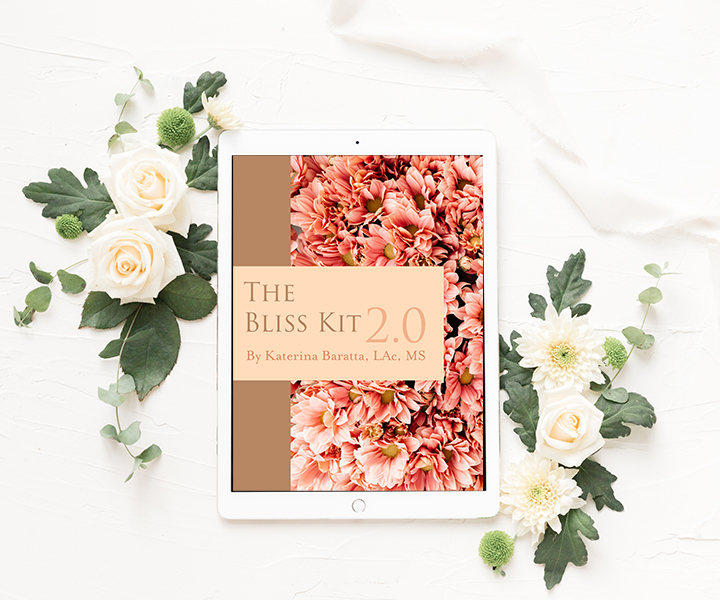This morning routine checklist gives you a framework so you know which routines to prioritize according to both traditional medicine and modern science.
One of the best ways to support your mental health is to build simple wellness routines into your daily life.
And the best place to start for many people is by establishing a morning routine.
But as your read through this article and the morning routine checklist, remember this:
The routines outlined here are just suggestions.
As is true with all things in life, there’s no one-size-fits-all solution to wellness and mental health.
You have a unique set of life circumstances that make the items on this morning routine checklist more or less relevant to you.
For example, when I was breastfeeding 5 times a night it wasn’t realistic or helpful for me to get up early to move my body.
Under those circumstances, sleep had to be my #1 priority and movement could come later in the day.
So notice what you’re drawn to and start there.
You don’t have to do all of this right away in order to see results.
Sometimes even the smallest shifts in routine make a big impact on your mental health.
Why are routines so powerful?
Routines impact mental health because we are creatures of habit.
Though we might crave adventure and novelty, it’s routine and predictability that help us feel safe and grounded.
Routines are like the book ends that keep an ever-shifting book collection from getting out of control.
And morning routines have an extra element of magic to them.
Because they set a foundation that you can stand on the rest of the day.
But before we get into the details of the morning routine checklist, I’ve got a few helpful tips so you can get maximum benefit from your morning routine.
The first thing you need to understand is how habits get formed.
There are 4 parts to every habit: a cue, craving, routine, and reward.
The cue is what sets the habit into motion.
It is based on past experience.
And when a specific thing happens —the cue— you anticipate the reward that will come at the end of the habit cycle.
So in the case of a morning routine, the cue could be waking up and looking at your yoga mat which is ready to go beside your bed.
When you step onto your mat you might anticipate the sense of groundedness and well-being that’ll come once you’ve completed your morning routine.
And it’s this craving that motivates you to take action.
Because you might wake up groggy and grumpy, but you want to feel refreshed and peaceful.
And if you’ve gone through your morning routine a few times, your body knows on a visceral level that you’re going to satisfy your craving by going through your morning routine.
Next up is the actual routine.
This is what most people think of when they think of a habit.
It’s when you do the things that you expect will bring you your desired reward.
And then finally the reward comes.
The reward reinforces your behaviors and motivates you to repeat the same behaviors the next morning.
The cue and reward are the most important parts of a habit to pay attention to when you’re starting up a new routine.
Because as we already established, we are creatures of habit.
And your old habits are comfortably embedded in your neurological wiring, whether they’re actually supporting your mental health or not.
So when you start a new morning routine, your neural wiring is going to work against you at first.
Because the more your repeat a specific behavior or habit loop, the stronger that connection becomes in your brain.
And making new connections makes your brain work harder.
If you want your morning routine to stick, you have to repeat your new habit loop enough times that those connections become more established in your brain.
And this is where the reward comes in.
Because the yummier your reward is, the more motivated you’ll be to repeat your new morning routine.
And the more you repeat your morning routine, the stronger those connections become in your brain.
Once you’ve established this routine in your neurology, it’ll be much easier to continue it in the future.
There are 3 things that can help you turn your morning routine into a habit you look forward to.
1. Start stupid small.
When you look at this morning routine checklist you’re probably going to want to do all of it at once.
Don’t.
Start with one tiny step.
A step that’s so small it would be stupid not to follow through.
Going off of the example we’ve been using, this might be to just step onto your yoga mat and take 1 deep breath first thing in the morning.
You have the option to do more, but you’re not committing to it yet.
Then, once you’ve successfully followed through on your new, stupid small morning routine for a week, you can extend your commitment to 2 minutes of deep breathing.
Once you’ve done that for a week, add in one sun salutation, and so on.
It is much more beneficial to do a little bit consistently than to do a big long morning routine only every once in a while.
2. The second thing that’ll help you follow through on your morning routine is to establish a clear cue.
In this example, the cue would be looking at the yoga mat that’s already rolled out next to your bed.
When you see the mat, you know that you need to step onto it to get your reward, which is the final thing that will motivate you to stick to your routine.
3. Then come up with a really juicy reward.
Or even a few rewards.
The first and easiest reward would be to bask in the feelings of accomplishment and satisfaction after completing your routine.
Maybe you also check off a box on your calendar every time you complete your routine.
And once you’ve completed 14 days or so you could make yourself a special chai latte, or get that meditation cushion you’ve been eyeing on Etsy (or whatever treat you choose).
Now you know how to set yourself up for success.
But what should you include in your morning routine so it supports your mental health?
Here is a morning routine checklist with ideas for you to choose from to support your mental health.
✓Get enough sleep
This is first on the list because good quality sleep is the foundation of mental health.
Scientific studies have shown a clear link between sleep and mental health, especially for women.1
If you don’t get good quality sleep, it’s a lot harder to get up and do your morning routine.
Your morning routine also won’t have as big of an impact as you want it to, because you’re more likely to feel stressed and anxious when you don’t get enough sleep. 3 , 4 , 5 , 6
So a solid morning routine actually starts the night before.
Click here to learn more about how to get more sleep when your mind won’t shut up.
✓Wake up with the sun (yes, even on weekends)
I know what you’re thinking.
Sleeping in feels so good, how could it be bad for mental health?!
It comes down to tuning your body to nature’s rhythms and supporting hormone flow.
Traditions like Indian Ayurveda and Chinese medicine have always recommended that you go to bed within a few hours after sunset and wake up just as the birds start to chirp.
And this ends up giving you more hours of sleep in the darker months of autumn and winter, when all living things in nature rest in order to conserve and build up their energy.
Once electricity started lighting up households, people fell out of this natural rhythm.
But stress is significantly reduced when we prioritize this traditional sleep schedule, especially when we stick to a regular schedule.
And this comes down to the circadian rhythm and hormone flow.
Hormones are your body’s messengers.
They help every function in your body run smoothly.
And ideally, specific hormones are released on a pretty predictable schedule by the suprachiasmatic nucleus in your brain which determines your circadian rhythm. 7
This is really important, because different hormones are needed at different times of day to perform different functions.
But if your circadian rhythm is off because of an irregular sleep cycle, your hormone flow gets wonky and your mind and body don’t function as well as you want them to.
Circadian rhythm disruption has been linked to depression, anxiety, and other negative health outcomes.
And it’s a whole lot easier to stick to a morning routine when you have a regular sleep schedule.8
Because after just a few days, you’ll start to notice that your body naturally gets tired and wakes up when you want it to.
So you’ll feel much more motivated to get out of bed and support your mental health with the rest of your morning routine.
✓Avoid technology first thing in the morning, especially emails and social media
Most people have their phones by their bed, but if you can avoid bringing your phone into your bedroom at all you’ll feel a lot happier.
Morning is a potent opportunity to relax your mind.
Your mind might tell you that you need to think a lot of thoughts right away, but if you spend some time clearing your mind instead of indulging it you’ll find that your thoughts are much more focused and on-point the rest of the day.
You’ll also feel a whole lot less stressed.
Because when you look at your emails and social media first thing in the morning, you’re looking outside of yourself to shape your reality.
You can’t control what other people think or say, but you’re letting them enter your mind without any sort of buffer.
When you use your morning routine as an opportunity to turn inward instead.
In doing so, you give yourself a moment to regulate your nervous system before outside forces start stressing you out.
✓Meditate
Meditation is a great way to regulate your nervous system, increase focus, and let go of unnecessary thought patterns.
Click here to learn more about meditation and how to get started.
✓Practice Gratitude
Spending some time focusing on what you’re grateful for every day can shift your mental health dramatically.
A 2019 randomized control trial published in Frontiers in Psychology found that writing a gratitude list for 14 days “managed to increase positive affect, subjective happiness and life satisfaction, and reduce negative affect and depression symptoms.”9
And remember how we talked about neurology earlier?
It applies here too.
The more you think or feel something the stronger those connections become in your brain making it easier it is to think or feel similar things in the future.
So when you make a gratitude list in the morning and focus on how the things that you’re grateful for make you feel, you’re priming yourself to think and feel more gratitude and appreciation throughout the day.
✓Go outside for at least 10 minutes before 9 a.m.
Spending time outside first thing in the morning has numerous benefits to your mental health.
First off, you’re exposing yourself to morning blue light, which supports your circadian rhythm.
Windows filter these rays out, so you have to go outside to get this benefit.
You can also boost your vitamin D levels when you let the sun shine on your skin.
This can be tricky in the winter and most people benefit from supplementation, but even just a few minutes of turning your face to the sun can be helpful.
If you happen to have access to a tree, some grass, or even a potted outdoor plant, you’ll also be supporting your mental health by connecting with nature while you’re outside, which has been proven to boost happiness and well-being. 10
✓Move your body
Your body doesn’t move a lot while you’re asleep, so it can feel really good to introduce movement back in first thing in the morning.
Maybe you want to follow your body’s lead and stretch or do a yoga routine.
You could also go for a brisk walk or jog and get the benefit of being outside at the same time.
Just like sleep, exercise has clearly been shown to improve mental health. 11
And it doesn’t seem to matter too much what type of exercise you do, so long as you get moving. 12
✓Drink a big glass of warm water
Dehydration means your body has to work harder to do what it needs to do.
This causes stress and can lead to mental health issues like anxiety and depression. 13
According to natural medicine traditions, cold water, however, douses your stomach fire and can slow down digestion.
So about 20 minutes before you eat anything, drink a big glass of warm water to get things moving and hydrate your system.
Even better?
Sprinkle in some sea salt for added electrolytes and squeeze some fresh lemon juice to help cleanse your liver. 14
✓If you’re hungry in the morning, eat a breakfast with protein and fat
Blood sugar balance is another physical phenomenon that has a major impact on mental health. 15
And a lot of people don’t realize that eating a carb-heavy breakfast is the culprit behind their mood disorder.
So if you’re hungry in the morning, make sure you’re packing your breakfast with protein and fat.
A bagel might look more substantial than nuts and seeds, for example.
But your body will break down the bagel much faster, making your blood sugar spike and then dip so you end up hungry and irritable before lunch.
Protein and fat take longer for your body to break down, so your blood sugar stays more stable until your next meal.
✓And if you want to get even more benefit, eat your breakfast in full present awareness
Also called mindfulness, eating in full present awareness is a great way to bring the benefits of your meditation practice into your everyday life.
And mindful eating has the added benefit of boosting your digestive power.
Because digestion actually starts in your mind.
Just by thinking about something yummy, you’re already triggering digestive juices to flow so your body is ready to break down and absorb more nutrients.
You’re also activating your parasympathetic nervous system’s rest and digest mode, so you start your day less stressed than you would otherwise.
Click here to learn more about mindful eating for beginners.
Now it’s your turn!
How will you design your morning routine?
Let me know in your Instagram stories, and be sure to tag me so I can see.
I can’t wait to see where this takes you!
References:
1. https://pubmed.ncbi.nlm.nih.gov/29244642/
2. https://pubmed.ncbi.nlm.nih.gov/29890964/
3. https://pubmed.ncbi.nlm.nih.gov/31613456/
4. https://pubmed.ncbi.nlm.nih.gov/32306048/
5. https://pubmed.ncbi.nlm.nih.gov/29542006/
6. https://pubmed.ncbi.nlm.nih.gov/32382403/
7. https://www.nigms.nih.gov/education/fact-sheets/Pages/circadian-rhythms.aspx
8. https://www.health.harvard.edu/blog/why-your-sleep-and-wake-cycles-affect-your-mood-2020051319792
9. https://pubmed.ncbi.nlm.nih.gov/30949102/
10. https://www.ncbi.nlm.nih.gov/pmc/articles/PMC5580555/
11. https://connect.uclahealth.org/2018/10/17/the-link-between-exercise-and-mental-health/
12. https://www.researchgate.net/profile/Buelent-Agbuga/publication/350965642_ScienceDirect_A_comparison_of_the_effects_of_hatha_yoga_and_resistance_exercise_on_mental_health_and_well-being_in_sedentary_adults_A_pilot_study/links/607d31a12fb9097c0cf37c6c/ScienceDirect-A-comparison-of-the-effects-of-hatha-yoga-and-resistance-exercise-on-mental-health-and-well-being-in-sedentary-adults-A-pilot-study.pdf
13. https://www.healthline.com/health/anxiety/dehydration-and-anxiety
14. https://www.nutraingredients-asia.com/Article/2017/06/12/Lemon-juice-protects-against-alcohol-induced-liver-damage-Study
15. https://sph.umich.edu/pursuit/2019posts/mood-blood-sugar-kujawski.html





